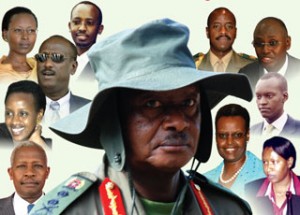Uganda’s plunder linked to Bahiima culture?
By Stephen Twinoburyo
30th April 2012:
From time to time, I have seen debates on social media and in the mainstream media referring to Uganda’s ethnic groups. This has often turned fiery whenever the discussion is about the ‘ruling’ Bahiima ethnic group. The most recent hullabaloo concerns comments attributed to an NTV presenter.
As a Munyankole who partly grew up in the predominantly Bahiima area of Nyabushozi, I wish to give my own opinion/analysis on the transition of Bahiima from traditional pastoralists to national role-players. Most of my blood relatives live, or used to live, in the Kazo-Kiruhura area in the former Nyabushozi, after my great grandfather migrated into the area; at least that is what the history presented by my father in his book “Ruganyirwa’s Grandchildren” says.
My father acquired land in rural Kiruhura and went on to develop it by fencing it, clearing the shrubs, digging a dam, and building the first tile-roofed house that I knew then in Nyabusozi. Most of this happened in the early 1980s when President Museveni was in the bush.
Much as this should have been a good development, the Bahiima neighbours were infuriated that this private land had been developed and fenced off. I remember a group of Bahiima pastoralists standing by the roadside gazing at my father’s farm and saying “Ekyata kyomwiru eki kikurize obunyatsi” – which, if loosely translated, means “this mwiru idiot has really nurtured pasture”.
That farm became a nightmare for us as a family after President Museveni’s NRA took power. On countless times, the pastoralists would cut the fence and graze their cattle within my father’s farm, while armed with spears, and later guns. While my father had troughs for properly watering the cows, they would push their cows directly into the dam, hence causing damage to it.
This became a hot issue, with people who were often said to be ‘connected’ to State House ‘backing’ the pastoralists and issuing threats. Eventually my father, on our advice for our safety, abandoned his farm. It was bought at a throw-away price by an “afande” (army officer). We were no longer living on it due to threats. My father in fact survived death at one point from a group of Bahiima by a whisker.
Our family left Kiruhura, and hopefully, I will never live in Nyabushozi again. President Museveni kept promising to meet my father over this matter to resolve it but like many things he has promised, this remained that – air. My father, not being a person used to the almost gutter-level lobby environment that has been established around Museveni, let the matter pass. I sent a letter to President Museveni to remind him of these events.
So why am I narrating all this? According to history, Bahiima were purely pastoralists, and according to them, all grazeable land belonged to them. Any place with good pasture was open to them and they had a right to graze that land. It’s therefore possible that our Bahiima neighbours genuinely felt entitled to the results of my father’s work.
After all, he was a Mwiru, and by default – he was meant to sweat! In the old days, a Muhiima man was recognised according to the number of cows he had, and some Bahiima believed that all cows belonged to the Hima race. There was a joke that when the Bahiima were being taken to Teso and Karamoja to fight after Museveni came to power, they were told that the purpose was to recover their ‘stolen’ cows.
This traditional belief of being ultimate possessors may in a way have given some Bahiima a notion that they had a right to possess anything good that belonged to a non-Muhima. In fact, some did not consider a non-Muhima to have a human status. For instance, when a Muhima would enter a bus full of people and see no Muhima among them, he would exclaim “egi baasi ketarimu muntu!” – meaning “how come there is no person in this bus”.
My narration here is not meant to denigrate Bahiima in any way but to provide perspective to some of the behaviours I notice. I have close Bahiima friends, some dating from our childhood days, and have had family linkages with Bahiima. The Bahiima may have left their cows but some of their traits seem to have remained.
Over the last two decades, most Bahiima have immigrated from their pastoral traditions into modern living. In the process, they have taken on other skills – for instance in governance, commerce, the military, professional services e.tc. This is very commendable, because any government needs to develop its citizens.
However my analysis winds down to the reports we hear that under Museveni, Bahiima occupy all top resource areas in the country. They are said to occupy all top army or security positions. Those who have acquired wealth have acquired it massively, such that they may not even know what they have.
The wanton plunder of national resources by those in power, or those connected to them has reached unprecedented levels. There is a belief among some people that those who are in positions of authority don’t care what happens to the country, but are interested in plundering it as much as they can, irrespective of how much they already have, and what poverty levels the rest of the Ugandans will sink to.
This brings me to the question that came to my mind and motivated my writing: Did some Bahiima carry their traditional traits onto the national arena? END. Please login to www.ugandacorrespondent.com every Monday to read our top stories and anytime mid-week for our news updates.
The views expressed above are solely those of the author – Editor
![]()


